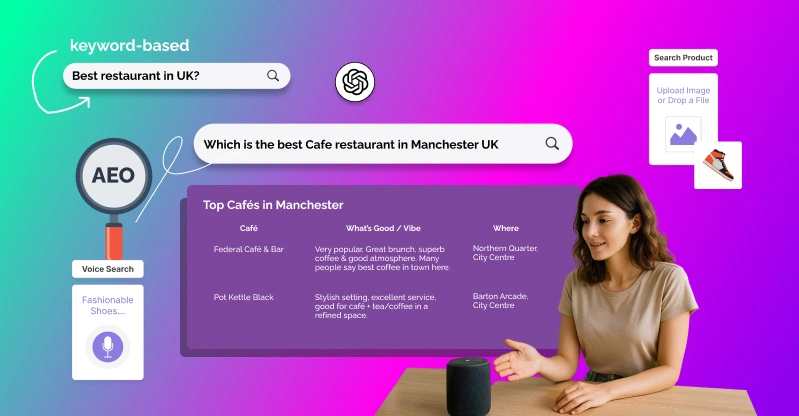How Answer Engine Optimisation Is Revolutionising the Future of Search Visibility in the UK

Table of Contents
In the UK’s increasingly competitive online economy today, it’s more difficult than ever to be noticed online. Conventional SEO, as a first one-off selection of methodology for visibility, doesn’t cut it anymore.
Consumers expect something better than rankings; they expect sites to deliver instant, precise, and relevant answers from any device, on any platform, anywhere.
This is where Answer Engine Optimisation (AEO) takes over. In tandem with Generative Engine Optimisation (GEO) and the use of Artificial Intelligence (AI), AEO is revolutionising the way businesses interact with their public.
All these tactics lead to creating a new, radical approach which gets sites not just looked at but considered by their viewers to be the raw source of solutions.
For UK businesses, adopting AEO is no longer a choice — it is now a requirement in an age where voice assistants, AI searches, and instant answers are the new normal.
What is Answer Engine Optimisation (AEO)
Answer Engine Optimisation (AEO) is the craft of writing online content such that it’s identifiable, readable, and digestible by AI-driven systems as an explicit question answer.
Unlike traditional SEO, which is all about better positions on SERPs, AEO is about being the answer in featured snippets, voice assistant responses, and AI-generated summaries.
To achieve this, AEO rests on several pillars. First, content needs to be question-based, answering users’ real questions they’re asking, generally in an informal, conversational style.
Second, answers need to be concise and well-written, with facts presented in short paragraphs, lists, or tables wherever suitable. Third, technical features like schema markup and structured data help answer engines understand and classify content.
Finally, content needs to be reliable and credible, since AI technologies prefer authoritative, up-to-date sources in selecting answers.
Why AEO Matters to UK Businesses
How Search Behaviour is Evolving
UK search trends have transformed dramatically. Voice search is gaining popularity, with increasing numbers of people using voice assistants and smart speakers to conduct question-like searches.
Instead of searching for a keyword such as “best tax software UK”, consumers are conducting searches such as “What is the best tax software for small businesses in the UK?”. This indicates that question-based optimisation is vital.
Search engines like Google are also moving in the direction of zero-click answers, where answers are given in the result itself, and there is no necessity to click through to a page.
Generation AI tools like Google AI Overviews, Microsoft Copilot, and ChatGPT are also giving synthesised overviews from several sources.

For UK users, this means that they are being presented with the response straight away, rather than browsing through search pages. Unless you AEO-optimise your content, you’re going to be left behind these premium domains.
Gaining a Competitive Advantage
As AEO is still new in the UK, businesses adopting it early get notice that their competitors do not. For example, a London mid-sized company optimising content for frequent customer questions has the potential to be the chosen authoritative answer by Google featured snippets and voice assistants. Not only does this increase visibility, but it also increases credibility in the brand.
Local Relevance
UK-specific optimisation is only one additional reason why AEO matters. Search engines and AI platforms already take local context into account — from spelling and phrasing (optimisation vs. optimisation) to geographically-specific customs, rules, and legislation.
Businesses writing in UK English, using UK examples, responding to UK-specific questions will accordingly fare better in how answer engines sort and present answers in this category.
Successful Implementation of AEO
Create a Question-Based Content Strategy
At the core of AEO is what questions your customers will be asking. Google’s People Also Ask, AnswerThePublic, and UK local forums reveal the real questions being searched. Exposed questions must be organically integrated into your site content, FAQs, blog content, and product descriptions.
Use Clear, Concise, and Unambiguous Answers
The key to becoming the “answer” selected is keeping it simple. Place the most relevant answer in the first two or three lines, and then continue by adding context information. This caters to both parties who are looking for instant answers and those who are looking for extensive information.
Optimise for Voice Search
As an increasing number of UK households own smart speakers like Google Nest or Amazon Alexa, voice search is also on the increase rapidly. When designing content, consider how an individual would speak a search term, not how they might type it. Use natural language, and ensure that your answers are brief enough to be naturally read aloud by a virtual assistant.

Build Trust and Authority
Answer engines prefer authoritative content. UK companies thus employ trusted local sources, refresh content with new rules, and show credibility with author biographies, citations, and external validation. Backlinks from quality UK sites and publications also boost authority signals.
Challenges to Consider
While AEO is a tremendous thing, there are also challenges that come with it. One of the biggest issues is zero-click searches. If your content is being used to provide quick answers, folks may not visit your site.
While you’re seeing greater visibility, conversion might be lower unless you have calls to action or you’re getting people to want to know more.
The other is the Big vs. Small bias of AI platforms, with a preference for big, well-known brands. The small UK companies may not become famous, but they can compete on niche terms, highly specialised solutions, and local content.
Finally, keeping content current and correct is necessary. Inaccurate, out-of-date responses can ruin user confidence and your chances of being selected by response engines.
This includes commitment to keeping content current and scheduling a consistent content audit.
Opportunities and Future Trends
AEO is only just beginning in the UK, yet a number of trends suggest its increasing significance.
Generative AI will become more embedded within search engines, so that answer-ready content becomes even more precious. Voice search will spread even wider as homes embrace intelligent devices.
Local search will increasingly matter, benefiting those with a hyperlocal keyword strategy, e.g., “Where are green cleaning products sold in Manchester?”
Multimodal responses, integrating text, image, and video, will also be returned, and so businesses will need to optimise not only written content but also images and media assets.
Finally, as more and more AI usage becomes prevalent, UK regulators will become more and more concerned with digital content transparency and trust.
It is the brands that demonstrate accuracy, compliance, and ethical responsibility that will thrive in this new world.
Conclusion
Answer Engine Optimisation is reshaping the character of visibility online. For UK companies, visibility as the response in AI-based queries, featured snippets, and voice responses is no less crucial than traditional SEO positions.
It calls for a shift in strategy: from the old keyword and ranking-centric approach to providing authoritative, question-based, and short answers that are human- and machine-readable.
Innovators today — producing question-driven content, voice-optimised, schema-markup’d, and trust-led — are the leaders of tomorrow’s next generation of digital search.
AEO is the primary path to maintaining visibility, authority, and growth for companies vying in the UK marketplace, where consumer behaviours are changing and competition is fierce.
FAQs
 Is AEO substituting conventional SEO?
Is AEO substituting conventional SEO?
AEO is additional, not a replacement. Keyword optimisation, building links, and having a technically solid site are still important. AEO is just adding another level on top of that by focusing on making content readable by answer engines, voice assistants, and computer systems so they can easily read and surface it.
Both complement each other, and UK companies need to use both if they are going to continue being findable in the changing search landscape.
 How do I gauge success in AEO?
How do I gauge success in AEO?
AEO success metrics are not just standard SEO metrics. Rather than just monitoring clicks and rankings, companies and SEO experts need to measure how frequently their content shows up on featured snippets, answer boxes, or voice answers.
Confirmation of increased branded searches, tracking “People Also Ask” results, and looking at engagement metrics like dwell time and conversions are just a few other ways to determine whether your AEO campaign is successful.
 Will voice assistants like Siri or Alexa show the content of any website?
Will voice assistants like Siri or Alexa show the content of any website?
While larger brands benefit because they are willing to pay more for authority of content and SEO, it does not mean that smaller sites cannot get ranked in voice search or AI-driven answers.
By answering narrow questions, answering with very exact and pertinent information, and being optimised for the local UK situation, smaller businesses can still be selected by answer engines. Relevance and quality level the playing field.



